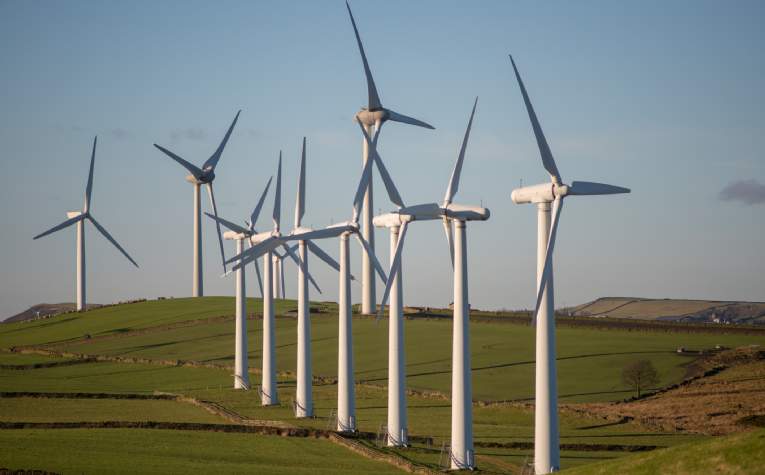2023 will mark four years since the UK became the first G7 nation to sign its commitment to net zero greenhouse gas emissions into law. The Net Zero Review attempts to evaluate progress and outline the wider economic opportunity, rather than just its environmental aims. Of the 129 recommendations, here are five that matter most to the rural sector.
1. Land Use Framework by mid-2023 In the net zero age, the demands placed upon land have multiplied. In addition to the traditional supply of resources such as food and timber, land is needed for carbon sequestration, energy, biodiversity provision and a number of other ambitions. The review criticised the Government’s lack of a 'clear plan for how we will manage these competing and interrelated demands on land' and recommended the publication of the Land Use Framework by the middle of this year at the latest.
2. A Net Zero Performance Certificate EPCs have been criticised for inaccuracy, unfairness, ineptitude – or a combination of the three. A recent report by The Times suggests this could well be true, stating that EPCs for properties with the worst rating (G) could be overestimating energy use by up to 344 per cent. Our Spotlight on the Rural Homes Energy Challenge indicates that these inequalities stand to disproportionally affect rural properties as tougher Minimum Energy Efficiency Standards are imposed.
Could that disparity be resolved with a new Net Zero Performance Certificate (NZPC)? Possibly. An NZPC could place more weight on carbon emissions than energy costs. The name change would then be a thinly veiled transition from an Energy Efficiency Rating (EER) to an Environmental Impact Rating (EIR), but this already features on an EPC. It is difficult to determine exactly what an NZPC would look like with little detail in the review, but if it is simply a name change, the rural-urban disparity will remain.
3. Minimum energy efficiency standard for all homes sold All homes sold by 2033 should have an Energy Performance Certificate (EPC) rating of C or above. Even if eventually called an NZPC, such a move would place additional pressure on the rural housing sector, which is already struggling to meet minimum EPC rental requirements. Without fundamental reform of the EPC system, rural and older properties will face substantial upgrade bills that will impact on asset value and further impact the amount of Private Rented Sector (PRS) stock in rural areas.
Exclusions around certain properties, such as listed properties, are expected but should not be relied upon, as the PRS demonstrates. Instead, asset owners would be wise to plan their investment case carefully before acting swiftly and decisively.
4. A Biomass Strategy, ASAP Sustainable biomass is seen as an important sector, particularly given the potential for it to become a negative emissions technology. The demand for bioenergy is great, given its positive credentials for meeting baseload grid demand from renewable sources. Indeed the Market in Minutes on the Future of Farm Fuels suggests that biomethane is a likely candidate to replace diesel fuel in the near future.
However, the 'UK’s use of bioenergy is growing faster than its supply from domestic sources'. As a result, the Net Zero Review recommends the publication of the Biomass Strategy as soon as possible and 'more should also be done to encourage sustainable UK biomass production', including the publication of the Land Use Framework to provide clarity to investors.
5. Scope 3 reporting for food and drink businesses Scope 1 emissions are direct greenhouse (GHG) emissions from sources that are controlled by an organisation. Scope 2 emissions are indirect GHG emissions from the energy an organisation purchases, such as electricity or heat. Scope 1 and 2 carbon emissions receive the majority of legislative attention.
However, the review recommends all UK-based food and drink businesses should be required to report their Scope 3 carbon emissions against a government and industry-agreed standard by 2030, with 50 per cent reporting as soon as 2025.
Scope 3 emissions are not produced by the organisation itself but by third parties which the organisation relies upon, up and down its value chain. Requirements around Scope 3 are therefore likely to have impacts upon the preceding supply chain – notably farmers – within a similar timeframe and so producers should look to implement measures that allow them to quantify their Scope 3 emissions. It is likely this requirement will eventually pave the way for legislation on reducing Scope 3 emissions in order to hit net zero targets and therefore, once again, impact producers.
What now?
Nothing. The Net Zero Review is just that, a review. There is no obligation for the Government to implement the recommendations and the review itself criticises the Government for 'not matching world-leading ambition with world-leading delivery'. Many of the recommendations affecting the rural sector consider pre-existing commitments rather than suggesting any additional leaps forward in policy.
However, this added weight behind the proposed direction of travel should be seen as providing some amount of certainty to proposed policies, certainty which has been lacking in recent months and years. While it may not be enough to prompt action from the rural sector, it provides some added reassurance that preparation and planning will not be in vain.
Further information
Contact Joe Lloyd or Andrew Teanby


-be-a-significant-emerging-asset-class-in-europe(1).jpg)
.jpg)
.jpg)
.jpg)




.jpg)